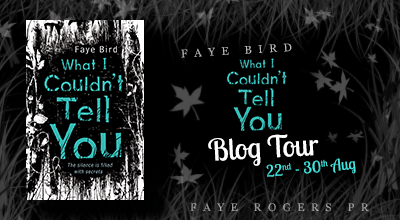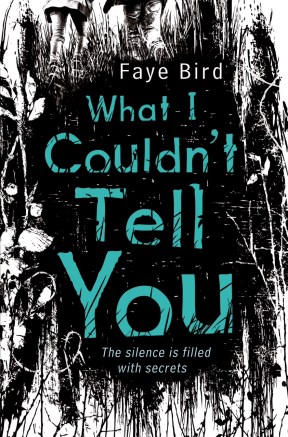
As an aspiring writer I’m delighted to be featuring a guest post by Faye Bird, author of What I Couldn’t Tell You, all about the writer’s voice today. What I Couldn’t Tell You is a young adult thriller published by Usborne on 1st May 2016 and is available in paperback and e-book from Amazon, W H Smith, Waterstones or via the publisher and other good book sellers.
What I Couldn’t Tell You

When love turns to jealousy, when jealousy turns to rage, when rage turns to destruction…
Laura was head over heels in love with Joe. But now Laura lies in a coma and Joe has gone missing. Was he the one who attacked her?
Laura’s sister Tessie is selectively mute. She can’t talk but she can listen. And as people tell her their secrets, she thinks she’s getting close to understanding what happened on that fateful night.
Voice
A Guest Post by Faye Bird
When you start out writing and you go to talks and panel sessions with industry folk – agents and publishers – there is much talk of a writer’s “voice.”
“A writer needs to have a voice,” they all say.
Most of the audience nod their heads, but I think to many the notion of a voice feels like an unknown and often massively intangible thing.
We know what it means for a character in a book to have a voice – it’s ultimately the voice of our story, and it needs to feel authentic, intrigue us, entertain us, draw us completely in.
But what is a writer’s voice? And where does it fit? And how do you even know if you’ve got one in the first place?
When I was working as a literary agent representing TV scriptwriters I felt pretty clear about what a writer with a voice was; he or she was, as all those agents and publishers say on those panels say, the writer I wanted to represent, and I most definitely knew when I had read a script by a writer who had one.
So here goes – here’s my best attempt at describing what it was that the writer with a voice had, from when I thought I knew…
A writer who handles their story with confidence – by which I mean someone who creates characters you wholly believe in, characters who behave in a thoroughly convincing way, but about whom you are still constantly asking questions along the way.
A writer who handles their story with ease – stories by their very nature are complex, but a writer with a voice, with the confidence of a voice, will make the complexity of his or her story look simple.
A writer who handles their story with originality – it’s a love story, it’s an adventure story, it’s an adventure love story about vampire eating pirate dogs in space. It doesn’t matter what it is. It is the way it is told that makes it original.
And lastly it is a writer who is ultimately an illusionist – as you read each sentence the graft that went into the words will be hidden, and so too the graft that has gone into capturing the potential enormity of its meaning. A seemingly simply sentence about a brief moment in time, a feeling or an otherwise ordinary event may not appear at first to say that much, but in the vast scheme of things it may well say EVERYTHING!
These are at the writers who I think have a voice, the writers I love to read, and the ones that I aspire to try and be as good as when I sit down to write.
About Faye Bird

Faye writes fiction for young adults. Before becoming a writer she worked as a literary agent representing screenwriters in film and TV. She studied Philosophy and Literature at Warwick University, but has otherwise always lived in London, and still does now. Her second novel, What I Couldn’t Tell You, was published on 1 May 2016.
You can follow Faye on Twitter or visit her website. There’s more with these other bloggers too:


Reblogged this on Don Massenzio's Blog.
LikeLike